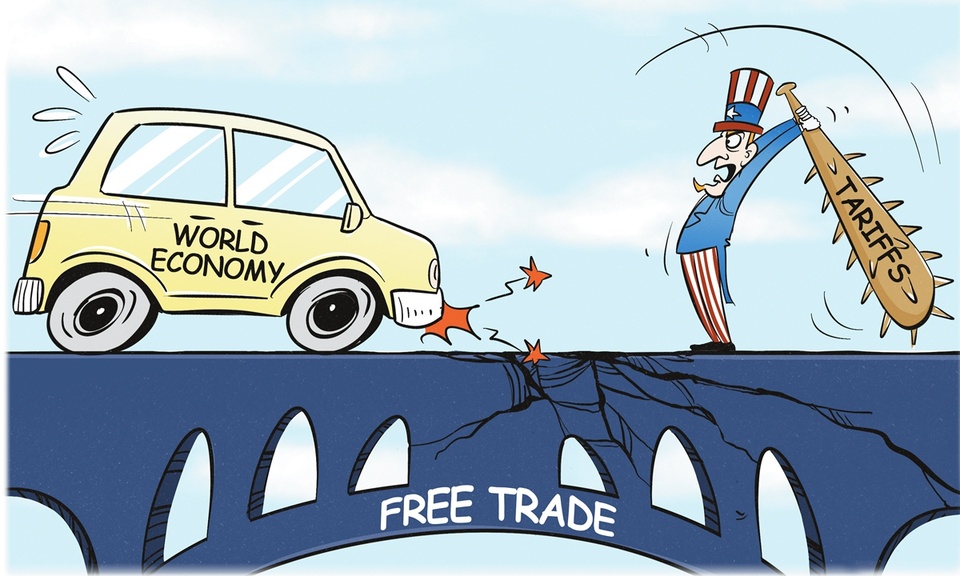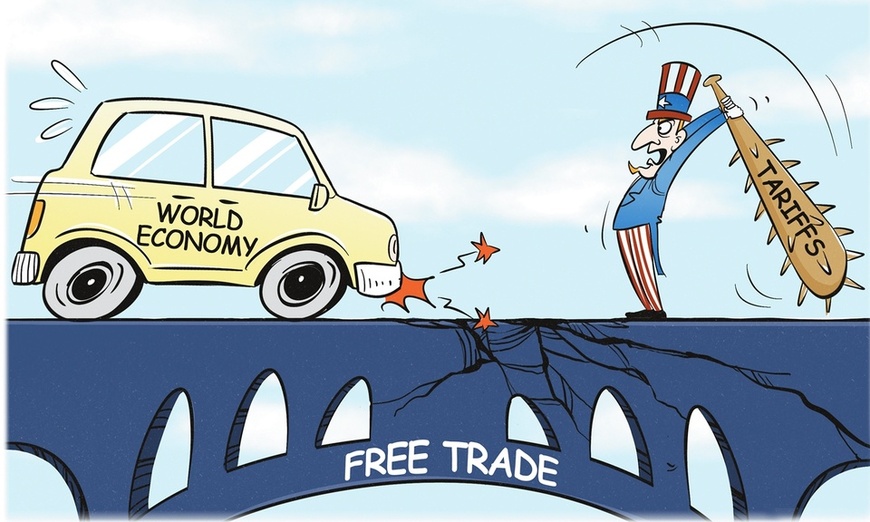By Zhong Sheng, People's Daily
The United States' recent unveiling of a so-called "reciprocal tariff" plan - a sweeping proposal to impose tariffs on all its trading partners - has drawn widespread backlash from the international community. Critics contend that beneath the veneer of "reciprocity," the plan is little more than economic bullying - a stark retreat into power politics that seriously unravels the multilateral trading system with the World Trade Organization (WTO) at its core and places global economic stability in jeopardy.
This policy is built on shaky grounds, relying on subjective judgments and unilateral assessments that severely infringe upon the legitimate rights and interests of other nations. While American officials justify the move as a correction to so-called long-standing trade imbalances, this narrative of American "victimhood" rings hollow. It not only disregards the balanced outcomes achieved through multilateral trade negotiations but also ignores the fact that the U.S. has long benefited substantially from international trade.
At its core, this tariff strategy is not about fairness - it is about force. It leverages the sheer size of the American economy to strong-arm weaker trading partners into compliance, sidelining the very principles of multilateralism. By targeting all trading partners without discrimination, the U.S. appears to be transforming "America first" into something even more insular: "America Only."
As The Economist observed, the U.S. takes its trade policies back to the 19th century, ignoring the fact that globalization has brought unprecedented prosperity to itself.
This blatant display of "might makes right" is a direct assault on the rules-based order that has underpinned global trade for decades. Chad Bown, a senior fellow at the Peterson Institute for International Economics, noted that the U.S. push for "reciprocal tariffs" violates WTO rules by discriminating among trading partners and unilaterally hiking duties beyond agreed limits.
The multilateral trading system, centered around the WTO, has played a crucial role in reducing trade frictions and fostering global economic stability and prosperity. The U.S. tariff plan does not just disrupt this system - it puts it at risk of collapse.
Already, America's closest partners are pushing back. European Commission (EU) President Ursula von der Leyen warned that the EU is now preparing for further countermeasures to protect its interests and businesses if negotiations fail. Swiss President Karin Keller-Sutter pointed out, "The country's long-term economic interests are paramount. Adherence to international law and free trade remains core values." The Brazilian government said it was evaluating all possible actions to ensure reciprocity in bilateral trade, including resorting to the WTO, in defense of legitimate national interests.
China, for its part, remains committed to multilateralism. As the world's second-largest economy and a firm supporter of the multilateral trading system, China continues to advocate for resolving trade disputes through dialogue and consultation - not through unilateral threats or protectionist measures.
China's position is grounded in the belief that the principles and rules of the WTO must be upheld, that trade and investment should flow more freely, and that shared prosperity can only come from open cooperation. China believes that multilateralism is the only choice for addressing global challenges, and economic globalization is an unstoppable trend of history.
In response to America's "reciprocal tariffs," China will take firm and effective measures to safeguard its legitimate rights and interests. At the same time, China will continue to work with other countries to uphold true multilateralism, defend the multilateral trading system, promote universally beneficial and inclusive economic globalization, actively participate in global economic governance, and strive to build an open world economy.
In today's era of economic globalization, retreating into beggar-thy-neighbor policies is not just short-sighted - it is self-defeating. Preserving the multilateral trading system is a prerequisite for safeguarding shared interests and securing lasting prosperity for all.
The U.S. should abandon its zero-sum approach, immediately withdraw its unilateral tariff measures, return to the path of dialogue and cooperation, and work with its trading partners on equal footing to properly resolve differences and deliver tangible benefits to people around the world.
(Zhong Sheng is a pen name often used by People's Daily to express its views on foreign policy and international affairs.)
This policy is built on shaky grounds, relying on subjective judgments and unilateral assessments that severely infringe upon the legitimate rights and interests of other nations. While American officials justify the move as a correction to so-called long-standing trade imbalances, this narrative of American "victimhood" rings hollow. It not only disregards the balanced outcomes achieved through multilateral trade negotiations but also ignores the fact that the U.S. has long benefited substantially from international trade.
At its core, this tariff strategy is not about fairness - it is about force. It leverages the sheer size of the American economy to strong-arm weaker trading partners into compliance, sidelining the very principles of multilateralism. By targeting all trading partners without discrimination, the U.S. appears to be transforming "America first" into something even more insular: "America Only."
As The Economist observed, the U.S. takes its trade policies back to the 19th century, ignoring the fact that globalization has brought unprecedented prosperity to itself.
This blatant display of "might makes right" is a direct assault on the rules-based order that has underpinned global trade for decades. Chad Bown, a senior fellow at the Peterson Institute for International Economics, noted that the U.S. push for "reciprocal tariffs" violates WTO rules by discriminating among trading partners and unilaterally hiking duties beyond agreed limits.
The multilateral trading system, centered around the WTO, has played a crucial role in reducing trade frictions and fostering global economic stability and prosperity. The U.S. tariff plan does not just disrupt this system - it puts it at risk of collapse.
Already, America's closest partners are pushing back. European Commission (EU) President Ursula von der Leyen warned that the EU is now preparing for further countermeasures to protect its interests and businesses if negotiations fail. Swiss President Karin Keller-Sutter pointed out, "The country's long-term economic interests are paramount. Adherence to international law and free trade remains core values." The Brazilian government said it was evaluating all possible actions to ensure reciprocity in bilateral trade, including resorting to the WTO, in defense of legitimate national interests.
China, for its part, remains committed to multilateralism. As the world's second-largest economy and a firm supporter of the multilateral trading system, China continues to advocate for resolving trade disputes through dialogue and consultation - not through unilateral threats or protectionist measures.
China's position is grounded in the belief that the principles and rules of the WTO must be upheld, that trade and investment should flow more freely, and that shared prosperity can only come from open cooperation. China believes that multilateralism is the only choice for addressing global challenges, and economic globalization is an unstoppable trend of history.
In response to America's "reciprocal tariffs," China will take firm and effective measures to safeguard its legitimate rights and interests. At the same time, China will continue to work with other countries to uphold true multilateralism, defend the multilateral trading system, promote universally beneficial and inclusive economic globalization, actively participate in global economic governance, and strive to build an open world economy.
In today's era of economic globalization, retreating into beggar-thy-neighbor policies is not just short-sighted - it is self-defeating. Preserving the multilateral trading system is a prerequisite for safeguarding shared interests and securing lasting prosperity for all.
The U.S. should abandon its zero-sum approach, immediately withdraw its unilateral tariff measures, return to the path of dialogue and cooperation, and work with its trading partners on equal footing to properly resolve differences and deliver tangible benefits to people around the world.
(Zhong Sheng is a pen name often used by People's Daily to express its views on foreign policy and international affairs.)
 Menu
Menu
 America's "reciprocal tariffs" are a direct attack on the multilateral trading system
America's "reciprocal tariffs" are a direct attack on the multilateral trading system

















